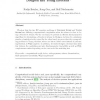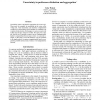8 search results - page 1 / 2 » Determining the Winner of a Dodgson Election is Hard |
FSTTCS
2010
Springer
13 years 3 months ago
2010
Springer
Computing the Dodgson Score of a candidate in an election is a hard computational problem, which has been analyzed using classical and parameterized analysis. In this paper we reso...
IANDC
2010
13 years 3 months ago
2010
We show that the two NP-complete problems of Dodgson Score and Young Score have differing computational complexities when the winner is close to being a Condorcet winner. On the ...
FCT
2007
Springer
13 years 9 months ago
2007
Springer
We investigate issues regarding two hard problems related to voting, the optimal weighted lobbying problem and the winner problem for Dodgson elections. Regarding the former, Chris...
CORR
2006
Springer
13 years 5 months ago
2006
Springer
We study the complexity of influencing elections through bribery: How computationally complex is it for an external actor to determine whether by paying certain voters to change t...
AAAI
2007
13 years 7 months ago
2007
Uncertainty arises in preference aggregation in several ways. There may, for example, be uncertainty in the votes or the voting rule. Such uncertainty can introduce computational ...


